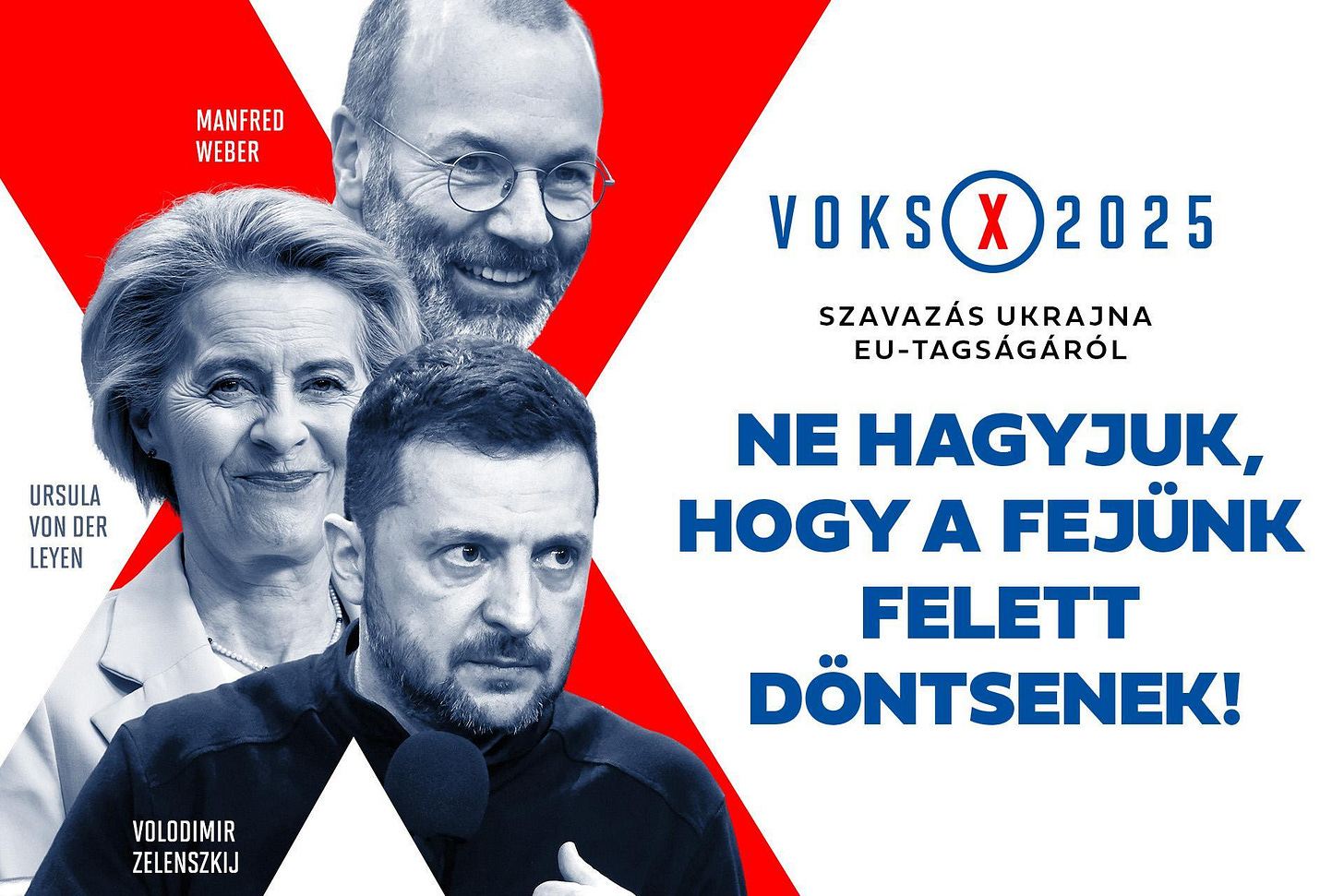VOKS 2025 – Orbán’s Most Recent Self-Adulation Exercise
With Orbán’s popularity in continuous decline, the government is looking for new ways to regain control.
Anyone who has followed the Orbán regime over the last decade will by now be familiar with the government’s frequent self-adulation exercises that come in the form of so-called national consultations. However, rather than truly consulting the Hungarian public, they are merely a performative exercise – essentially “marketing campaign letters”, sent to every Hungarian household to be filled out and returned. Having lived in Hungary for a brief time in 2015 myself, I received one of these consultations in the mail (and threw it away, unanswered).
Moreover, these national consultations have little actual value or policy impact but rather serve the government to demonstrate the popularity and public support for its ideas – even if less than half of the eligible population returns these questionnaires. National consultations often give a short, ideologically charged, oversimplified prompt on an issue, to then ask leading questions to assess the Hungarian population’s approval of whatever Fidesz’s position on the topic might be. Overall, while pretending that Hungarians’ responses to these consultations will influence their policymaking, they generally only serve to generate the answers the Fidesz government seeks. As such, these “pseudo-polls” dressed up as direct democracy are in line with populists’ claim to represent the “true” people – even if that is less than half of Hungarians as those who returned the ballot mostly agree anyway.
In the past, several national consultations have been conducted over issues related to immigration, specifically also related to György Soros, the Hungarian-American financier and philanthropist who is often connected to Europe’s migration crisis in far-right conspiratorial circles and whom Fidesz has often instrumentalised in its anti-“Brussels”, anti-immigration campaigns over the past decades. Needless to say, these consultations are paid with tax-payer money, which would have found better use in renovating run-down hospitals and childcare institutions, which are in a dire state.
As most recent polls continue to show Péter Magyar’s Tisza clearly leading over Fidesz, the government has come up with another way to try to mobilise people ahead of the 2026 election. With VOKS 2025, as this most recent national consultation is called, Fidesz once again seeks to stoke fear and anger among Hungarians – against the opposition, Brussels and above all, Ukraine.

The VOKS 2025 consultation mainly asks Hungarians about Ukraine’s accession to the EU, its core question being: “Do you support Ukraine's European Union membership?” While the question is by far not as leading as previous ones, the topic has nonetheless been instrumentalised by Fidesz in recent months after accession negotiations were opened in 2023 and officially started in June 2024. However, there is no level of urgency, as there is no clear timeline for Ukraine’s EU accession and it will likely take years, if not more. Yet, given the apparent lack of other topics to talk about and mobilise people on, the issue of Ukrainian accession has received widespread attention in Hungary thanks to Fidesz, who continuously talks about it, spreading disinformation and trying to raise opposition to the neighbouring country’s EU accession.
According to the government, what is at stake (politically irrelevant) referendum is "whether we can prevent Ukraine's European Union accession and if we can save Hungarians from the associated risk." What risk, you might ask? According to Fidesz, it would involve "huge risks impacting businesses in Hungary, damaging the agriculture, jeopardising jobs and even pensions." Moreover, Orbán is warning about the economic consequences of Ukraine’s accession, which is quite ironic looking at the dire state of the Hungarian economy after 15 years of Fidesz’s rule.
Overall, Fidesz is framing this as an issue that could determine Hungary’s future in the next decades, as so often painting it as an existential threat to the Hungarian nation. Meanwhile, Fidesz is also reverting to its Euroscepticism, blaming Brussels’ bureaucrats for jeopardising Hungary’s future.
Magyar Nemzet, a pro-government propaganda outlet, claims that the government will treat the result as “politically binding”, although it is unclear how so. Once Ukraine is ready to join the EU, every EU member state has to sign and ratify the country’s accession treaty. Orbán’s Hungary could thus refuse to sign and ratify the treaty – but again, it will take years until then.
Perhaps even more interesting, VOKS 2025 sparked barely any interest among Hungarians according to Google Trends data. A comparison between VOKS 2025 and “A Tisza féle Nemzet Hangja" (The Voice of the Nation, Tisza style), a similar-style referendum announced by Orbán’s primary challenger, Péter Magyar and his Tisza Party, that started on March 24, shows that people were much more interested in the latter’s referendum. Meanwhile, VOKS 2025, like previous national consultations, will cost billions in HUF (Hungarian Forints), which means several million Euros in taxpayers’ money. All of this, for little to no added value to Hungarians.
In the end, this latest national consultation is nothing but an attempt to distract the people and regain control of the narrative: Pretending that Fidesz and its views are popular and that they care about the Hungarians while everyone else, whether that be Brussels, Ukraine, or the opposition, is recklessly endangering the Hungarian nation. Whether it will help Fidesz regain the upper hand in the polls is rather doubtful.
Gabriela Greilinger




